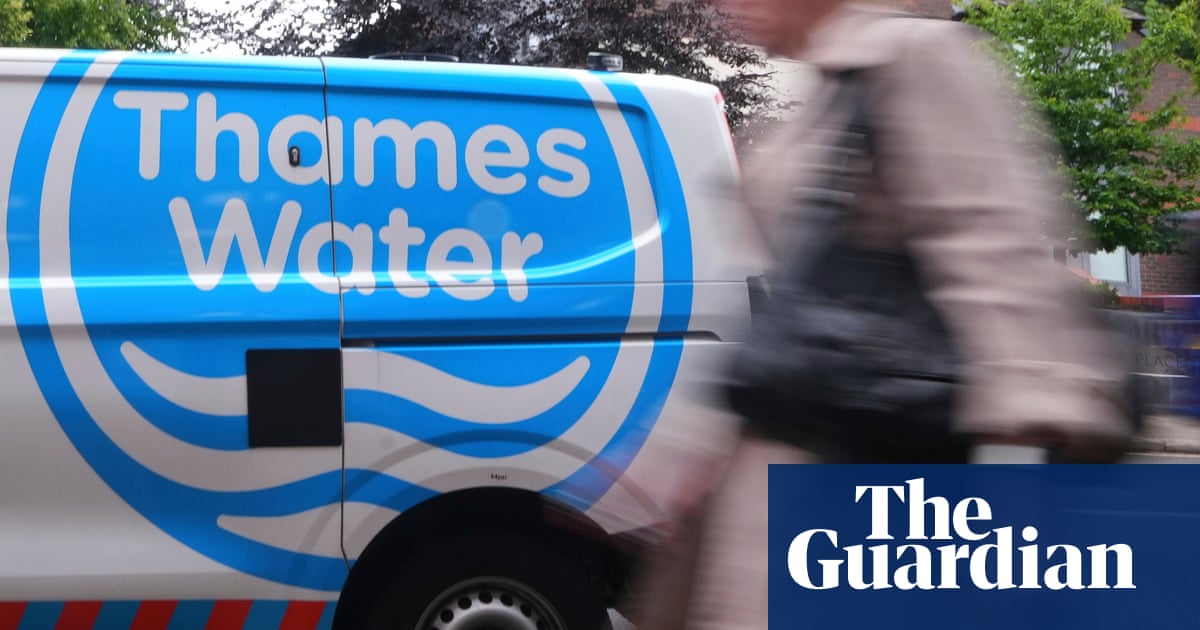Lenders vying to take overThames Waterhave demanded that the struggling company and its management be granted immunity from prosecution for serious environmental crimes as a condition of acquiring it, the Guardian can reveal.
Creditors want the environment secretary, Steve Reed, to grant the water company extraordinary clemency from a series of strict rules covering everything from sewage spills to failure to upgrade its water treatment works.
The demands, if successful, would render the Environment Agency (EA) largely powerless to take enforcement action against Britain’s biggest water company for some of the most serious criminal breaches of its licences and permits.
Thames Water has been aserial offender in recent years, paying tens of millions of pounds in fines and penalties, with multiple convictions fordumping raw sewage into rivers and streamsanddozens more investigationsunder way.
The fate of the heavily indebted utility was thrown into further doubt this week when the US private equity firm KKRquit an auction to buy it, citing concerns about politicisation and the poor state of its assets.
That has left a disparate band of about 100 bondholders, who have collectively lent the company about £13bn, as the sole bidder. If the creditors’ bid fails, ThamesWateris likely to fall into state ownership via the special administration regime – a fate the Treasury is desperate to avoid.
Sources described the creditors’ list of demands as a “ransom note” that underlined their powerful negotiating position as the “last show in town”.
Creditors argue that failure to secure leniency from fines and enforcement will mean Thames Water is caught in a “doom loop” that prevents it from recovering and injecting enough money into its tired network. The company, which has 16 million customers in the London and Thames Valley regions and 8,000 employees, is labouring under about £20bn of debt and is running out of cash.
The requests formed part of the creditors’ turnaround plan that was put to the water regulator, Ofwat, in recent days. Among the proposals were that the EA stops enforcing personal liability for managers at Thames Water and does not pursue enforcement over the company’s failure to deliver a huge number of infrastructure upgrades, known as the water industry national environment programme (Winep).
The Guardian revealed in December that Thames Water intentionally diverted millions of pounds pledged for Winep environmental clean-upstowards bonuses and dividends,sparking an Ofwatinvestigation. Customers have already paid for those projects via their bills. Thames Water failed to deliver more than 100 of 812 Winep schemes it was due to between 2020 and 2025.
Other creditor requests include not prosecuting Thames Water for sewage spills on dry days or for“flow to full treatment” licence breaches– where the EA and Ofwat police how much wastewater its plants can treat at any time.
They also want Thames Water to be exempt from prosecution for breaches of the industrial emissions directive, which governs pollution into rivers, streams, land and the atmosphere.
To achieve these requests, the creditors want Reed to give a strategic decision statement ordering the EA to deprioritise enforcement.
The Guardian revealed in March that Thames Water wasdemanding leniency for fines and penaltiesin order to attract bidders and stop cash they might inject from leaking out of the business.
However, the extent of the creditor demands, and request for near-blanket immunity for serious environmental crimes, has surprised water industry insiders, who warned it could spark legal challenges from rivals or lead to more requests for special treatment.
Sign up toHeadlines UK
Get the day’s headlines and highlights emailed direct to you every morning
after newsletter promotion
Last month Ofwatfined the company£123mover sewage and dividend breaches. The regulator said its investigation had uncovered failings around Thames’s handling of sewage and wastewater, which amounted to a “significant breach” of its legal obligations.
The EA is still pursuing parallel investigations into Thames Water over alleged failure to comply with environmental permits, and has powers to prosecute the company.
Creditors are expected to write down a significant proportion of their debt in return for taking over the company. Time is running out to find a solution to keep it afloat as it burns through £3bn of high-interest rescue loans.
A spokesperson for the creditors declined to comment on commercial discussions but confirmed their plan required “regulatory support”.
“The creditors’ proposal will fix the fundamentals, protect public health and prioritise improved customer and environmental outcomes,” they said. “In addition to a detailed operational plan and billions in fresh investment proposed by the creditors, Thames Water requires a fundamental reset and regulatory support so that asset health and performance can be restored to the levels that customers and the environment deserve.
“The creditors are committed to working with the government and regulators to achieve that outcome as quickly as possible and expect Thames Water to be held to account to deliver a realistic but ambitious trajectory for the company’s return to compliance.”
A government spokesperson said: “The company is stable and government is carefully monitoring the situation. We expect the company to continue to meet its obligations to both customers and the environment.”
An Ofwat spokesperson said: “Our focus is on ensuring that the company takes the right steps to deliver a turnaround in its operational performance and strengthen its financial resilience to the benefit of customers. We are assessing whether the [creditors’] plans are realistic, deliverable and will bring substantial benefits for customers and the environment.”
Thames Water said: “In order to be investable, we and prospective investors would need to engage in discussions with our regulators.”
